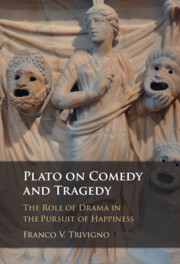Refine search
Actions for selected content:
409 results
Chapter 7 - Emerson’s “Experience” and Plato’s Republic
-
- Book:
- Emerson, the Philosopher of Oppositions
- Published online:
- 20 November 2025
- Print publication:
- 22 January 2026, pp 137-151
-
- Chapter
- Export citation
Introduction
-
- Book:
- Emerson, the Philosopher of Oppositions
- Published online:
- 20 November 2025
- Print publication:
- 22 January 2026, pp 1-8
-
- Chapter
- Export citation
ARISTOTLE AND THE IDENTIFICATION OF FORMS AND IDEAL NUMBERS IN PLATO
-
- Journal:
- The Classical Quarterly , First View
- Published online by Cambridge University Press:
- 12 December 2025, pp. 1-14
-
- Article
-
- You have access
- Open access
- HTML
- Export citation
Chapter 19 - Plato
- from Part III - Individuals
-
-
- Book:
- Personal Religion in the Ancient Greek World
- Published online:
- 25 November 2025
- Print publication:
- 11 December 2025, pp 428-451
-
- Chapter
- Export citation
THE GALLO-ROMAN DODECAHEDRON AND THE RECEPTACLE OF ALL BECOMING
-
- Journal:
- The Antiquaries Journal , First View
- Published online by Cambridge University Press:
- 17 November 2025, pp. 1-24
-
- Article
- Export citation
Chapter 4 - Plato’s Definition of Tragedy
-
- Book:
- Plato on Comedy and Tragedy
- Published online:
- 24 October 2025
- Print publication:
- 13 November 2025, pp 125-163
-
- Chapter
- Export citation
Chapter 7 - The Unity of Comedy and Tragedy in the Symposium
-
- Book:
- Plato on Comedy and Tragedy
- Published online:
- 24 October 2025
- Print publication:
- 13 November 2025, pp 220-247
-
- Chapter
- Export citation
Chapter 2 - Comedic Characterization in the Euthydemus
-
- Book:
- Plato on Comedy and Tragedy
- Published online:
- 24 October 2025
- Print publication:
- 13 November 2025, pp 54-87
-
- Chapter
- Export citation
Chapter 5 - Tragedy and the Best Life in the Gorgias
-
- Book:
- Plato on Comedy and Tragedy
- Published online:
- 24 October 2025
- Print publication:
- 13 November 2025, pp 164-187
-
- Chapter
- Export citation
Chapter 6 - Tragedy and Death in the Phaedo
-
- Book:
- Plato on Comedy and Tragedy
- Published online:
- 24 October 2025
- Print publication:
- 13 November 2025, pp 188-219
-
- Chapter
- Export citation
Chapter 3 - Parody in the Cratylus
-
- Book:
- Plato on Comedy and Tragedy
- Published online:
- 24 October 2025
- Print publication:
- 13 November 2025, pp 88-124
-
- Chapter
- Export citation
Chapter 1 - Plato’s Definition of Comedy
-
- Book:
- Plato on Comedy and Tragedy
- Published online:
- 24 October 2025
- Print publication:
- 13 November 2025, pp 18-53
-
- Chapter
- Export citation
1 - Debussy as Reader
- from Part I - Aesthetics
-
-
- Book:
- Debussy Studies 2
- Published online:
- 15 November 2025
- Print publication:
- 06 November 2025, pp 15-39
-
- Chapter
- Export citation

Plato on Comedy and Tragedy
- The Role of Drama in the Pursuit of Happiness
-
- Published online:
- 24 October 2025
- Print publication:
- 13 November 2025
2 - Against the Galileans I
-
- Book:
- The Narrative Conflict of Traditions in the Late Antique World
- Published online:
- 22 September 2025
- Print publication:
- 09 October 2025, pp 73-98
-
- Chapter
- Export citation
5 - Episodes in Rival Narratives
-
- Book:
- The Narrative Conflict of Traditions in the Late Antique World
- Published online:
- 22 September 2025
- Print publication:
- 09 October 2025, pp 158-197
-
- Chapter
- Export citation

Plato's Unwritten Doctrines
-
- Published online:
- 22 September 2025
- Print publication:
- 16 October 2025
-
- Element
- Export citation
PLATO’S MOTLEY: DECEPTION IN THE STATESMAN
-
- Journal:
- Greece & Rome / Volume 72 / Issue 2 / October 2025
- Published online by Cambridge University Press:
- 16 September 2025, pp. 224-250
- Print publication:
- October 2025
-
- Article
- Export citation
Chapter 7 - Plato
-
- Book:
- Aggregation and Antithesis in Ancient Greece
- Published online:
- 21 October 2025
- Print publication:
- 28 August 2025, pp 173-190
-
- Chapter
- Export citation
PRISON-BREAKING FROM PLATO’S CAVE
-
- Journal:
- The Classical Quarterly , First View
- Published online by Cambridge University Press:
- 06 August 2025, pp. 1-12
-
- Article
-
- You have access
- Open access
- HTML
- Export citation
